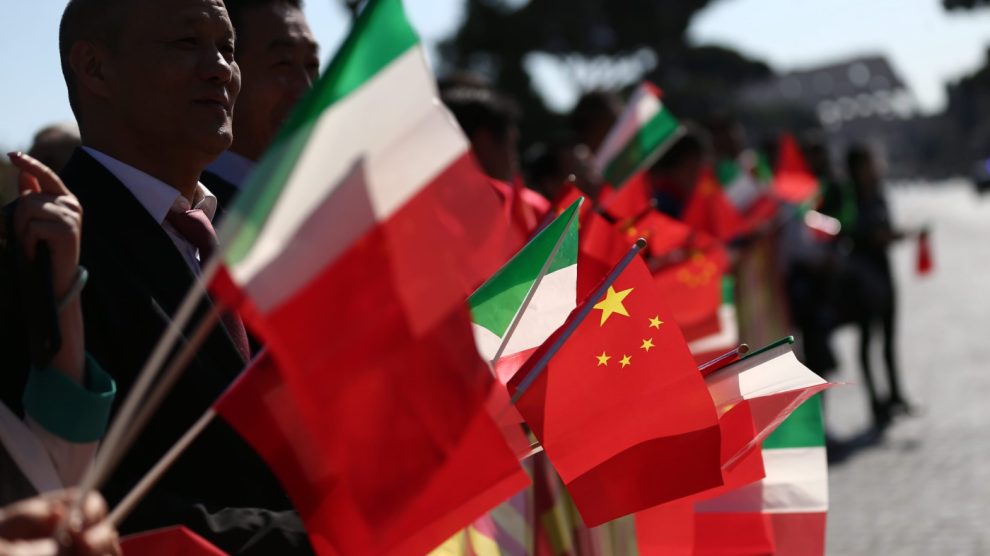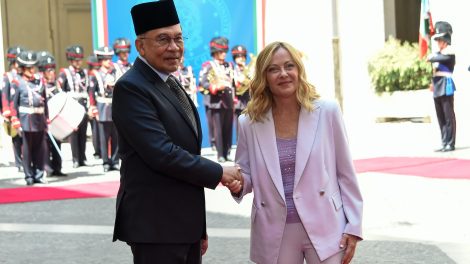Asti’s new Chinese sister city. On Tuesday, the administration of the northern Italian city of Asti – represented by Mayor Maurizio Rasero, several city councillors and Regional Governor Alberto Cirio – signed a twinning agreement with representatives from Nanyang, a Chinese city in the Henan region.
- The latters included Liu Kan, the Chinese Consul-General in Milan; Zhu Shixi, a representative of the Nanyang government; and Yang Shuguang, deputy mayor of Nanyang, plus several businessmen.
A years-long rapprochement. The twinning concludes a process that started in 2012 when the previous administration signed a “friendship pact” with the Chinese city. Contacts between Asti and Nanyang “continued and intensified in the last period,” reads an official note from the current municipality, led by Mayor Rasero, a former member of Forza Italia who got elected on a civic platform.
- The City Council approved the twinning in March, officially formalising the twinning “to increase ties of friendship and mutual support, establishing relations in economic, cultural, tourist and social spheres between geographically-distant regions. In addition, twinning is a complex action that offers stimuli and prospects and is a concrete opportunity for intercultural action,” reads the note.
The details. The parties “reaffirm their interest in developing and improving friendly and cooperative relations based on mutual respect and help” to consolidate economic relations and develop “models that enable the two communities to improve and expand their opportunities in the commercial sphere” and to promote “tourism and cultural heritage by involving local realities, to enhance mutual cultural and social originality.”
- One article stipulates that “all activities envisaged or arising from the implementation of this Twinning Act will be covered, for the Italian side, in the budget of the Municipality of Asti, without generating financial burdens on the State.”
- Another mandates that the parties “will inform, when necessary, the relevant Embassies of their respective countries on the initiatives planned to implement this twinning.”
From the horse’s mouth. Consul Liu repeatedly thanked the Asti community, calling the city a “friend” and recognising Piedmont as a “very economically-developed place” whose cooperation with China “is very strong.” On his part, Mayor Rasero stressed that twinning “does not come about by accident. If we are here today, we owe it to Zhao Zhijun, thanks to whom I got to know China.”
- Mr Zhao is the head of Cijan Auto Shock Absorber, which has acquired the historic Asti-based automotive company Way-Assauto in recent years and opened an Italian wine shop (which offers bottles from Asti) in Nanyang.
Getting down to business. After the ceremony, the Chinese delegation went to the local Chamber of Commerce, which facilitated a meeting to expand business exchanges between Asti and Chinese entrepreneurs. In December, the group signed a memorandum of understanding with the Chinese Chamber of Commerce in Italy to facilitate economic, commercial and socio-cultural exchanges.
- The signing had taken place on the sidelines of the “Sino-Italian relations and economic and trade cooperation in the new situation” forum held in Milan. Invitalia, Italy’s business location agency, and the Chinese Chamber of Commerce in Italy signed another MoU on that occasion.
- But representatives from Asti and China met several times over the past weeks. On April 19, it was a delegation from Fuyang/Hangzhou of Zhejiang Province. On April 27-28, representatives from the Hong Kong Trade Development Council.
- Another official visit is expected, date TBD: that of the Hefei delegation, which will be flanked by the bureaus of science and tech, economy and trade and will sign a letter of intent – the first step in a shared path, as the Asti administration recently declared.
The China Telecom link. On April 20, the Italian city administration also received representatives from State-owned China Telecom – notably Vice President Li Cao and country manager Alex Lin, whom Mayor Rasero had met the day before in Milan at the Chinese Consulate General. A later note spoke of “a fruitful meeting,” which, “in addition to raising awareness of the artistic and architectural beauties and food and wine excellences of our city and our territory […] initiated a constructive discussion for future projects in the development of planning strategies to raise awareness of Asti through smart technologies.”
- China Telecom was branded a national security risk by the United States Federal Communications Commission in March 2022. Previously, it had been delisted from the New York Stock Exchange following an executive order; the FCC had revoked its licence to operate in the country, citing national security reasons.
Mayor Rasero’s role. The Italian politician went on a mission to China in 2018, just under a year after taking office at City Hall. In early February 2020, he had gone out of his way to send masks and other materials to China to cope with the nascent epidemic. More recently, he explained that the friendship, born of business relations, was strengthened precisely by the Covid-19 pandemic (regardless of China’s lack of cooperation with international authorities to identify its causes).
- “Relations have grown closer and closer,” said Mayor Rasero, thanking Mr Zhao, who “unlike many other foreign businessmen, who have a ‘shopping cart’ mentality, […] wanted to get to know our city, understand its potential, and buy a house in the Asti area as well.”
- He also thanked Consul Liu, noting he shares “an excellent personal relationship” with him. In November 2020, one of the 25 chapters of the book “A History of Friendship” (Anteo Edizioni), with a prologue by then-Chinese Ambassador Li Junhua, was dedicated to Mayor Rasero’s greeting and friendship between China and Asti.
- In January of this year, Asti’s first citizen appeared within a news report aired on China Central Television, the Chinese State channel, with his Chinese New Year greetings.
The risks of twinning. In the city-twinning process, Chinese counterparts “may try to create the impression of being civil society organisations, but any kind of work involving liaising with foreigners is automatically political and therefore necessitates Party oversight,” stressed Mareike Ohlberg, Senior Fellow at the German Marshall Fund, at a March hearing before the US-China Commission in Washington, DC.
- “The CCP or the PRC government may try to use this broader liaison work for various purposes, including [making] political friends who are willing to represent the interests of the PRC publicly or lobby behind the scenes. If it encounters opposition [from] a national or federal government, it may also try to exert pressure on it by trying to win over local governments, businesses or other interest groups. This kind of work can also involve the work of intelligence organisations operating behind front organisations,” she added.




